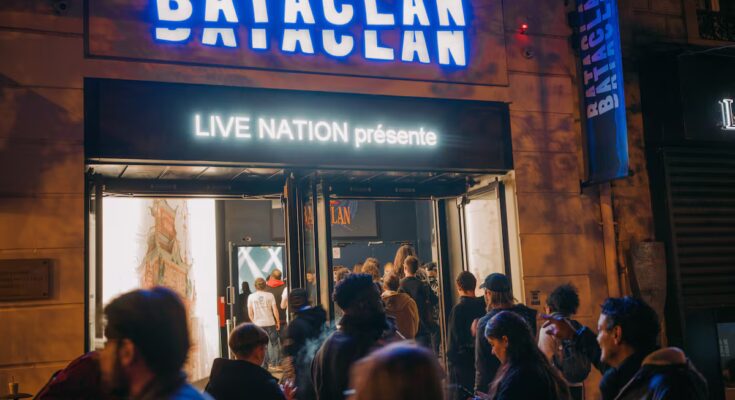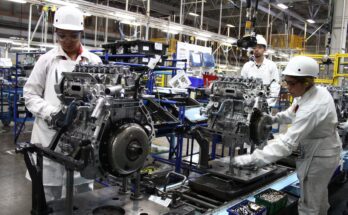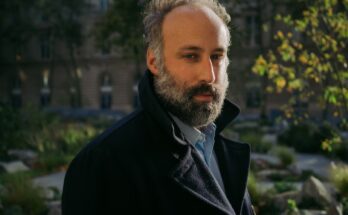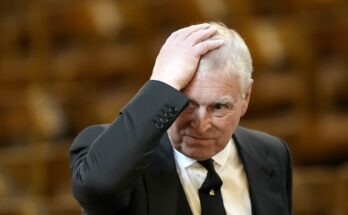The first chords of kiss the devil by Eagles of Death Metal, They played on stage while their lead singer, Jesse Hughes, held the microphone. Then that noise erupted. And a strange smell. Some thought it was some sound effects, firecrackers. Others didn’t doubt it. “I was sure it was gunshots. I really like video games and I know those sounds. Then I approached the balcony overlooking the stage and saw the carnage. My friend panicked, ran inside and I knew he was going to die. I went out of a window to try to get onto the roof, but I couldn’t and I stayed there for ten minutes,” recalls David Fritz Goeppinger, in a bar near the Seine. It was Friday 13 November 2015 at the Bataclan in Paris.
The sound was that of three AK-47 rifles belonging to the terrorists machine-gunning the 1,500 people in the room. And the attacks that night had just begun. In synchronized action between 9:20 p.m. on Friday and at 1.40am on Saturday, three nine-man commandos with automatic weapons and explosive belts killed 130 people and wounded 350; In the Bataclan 90 people lost their lives. On various terraces and restaurants from the 10th and 11th arrondissements of Paris, another 39. At the Stade de France, one more. The Islamic State (ISIS) terrorist group, which still controlled cities such as Raqa, Syria, or Mosul, Iraq, claimed responsibility for the attacks a few hours later. A response, they announced, to France’s participation in the international coalition that bombed their positions in the two Arab countries.
The chosen targets – a stadium, cafes and a concert hall – represented “places of fun and sin”. But if they tried to destroy the lifestyle of a great hedonistic and diverse European capital, they failed. Last Wednesday afternoon life continued in front of some of those cafes near the Saint-Martin canal. “We all remember where we were that night, but they didn’t shoot us down,” explains Alain, a customer at the La Bonne Bière bar, where five people died.
Paris is today an island in a France depressed by the political and social crisis. The city teems with overflowing cultural and recreational effervescence. Most cafes are still open. The Bataclan schedules concerts almost every day, even before and after the tenth anniversary. Consequences? “Today’s young people are not the same as those of 10 years ago, and they do not have the same relationship with those events. This does not mean that nothing happened or that it did not leave its mark. It clearly left its mark on all those who experienced it firsthand. And also on a collective level: the evolution of the anti-terrorism law, the creation of memorials, documentaries, books… But, as in Madrid, 9/11 did not have a lasting impact on the use of trains. Cercanías, November 13 changed the way of life of Parisians”, explains the sociologist Gérôme Truc, who has investigated the reactions to jihadist attacks in Western societies and is the author of Siderations. A sociology of attempts.
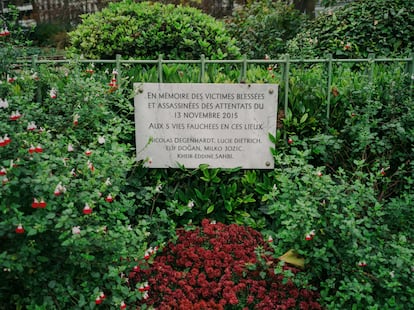
David Fritz survived that night. Also Sébastien and Charlotte, the other two people who were hanging from the windowsill of the building and then went up into the corridor where the terrorists held them for two and a half hours with eight other hostages. Ten years later, and countless events such as a pandemic, a war in Ukraine and, above all, the fall of the ISIS caliphate, a part of France has entered post-traumatic therapy with the most disparate effects.
François Hollande, then President of the Republic, showed up in the concert hall that same evening. Ten years later, in his office as former head of state, he analyzes the impact of that sequence on France for EL PAÍS. “The country resisted, it formed a group. There were no demonstrations by Frenchmen against other Frenchmen. The situation was controlled, even if the clash was monstrous. And in the elections that followed, the far right did not have a clear advantage. Not even in the presidential elections. But Islamic terrorism is a slow poison. Over time the fear arose, even if the attacks decreased in intensity, that our society will change, that it will not be guided by the same values, that we will be overwhelmed by violence, by a population which does not resemble the one that has been here for a long time, this is the game of the far right,” he emphasizes.
Hollande believes that after those attacks “Islam, more than immigrants themselves in general, has become the target of that ideological spectrum.” And the divisions became more pronounced. “Today the cohesion of the time, the national unity of the time, does not exist. The division has been established. The idea of coexistence, very strong at the time of the attacks, has broken down. There has always been confrontation, but we were united by a series of values. Today it is no longer like that. Everyone has isolated themselves and settled into their own certainties, their fears. And the social networks have done a lot of damage. Today the parties are weak, the unions are no longer powerful, and this allows certain radicalism is taking hold,” he warns.
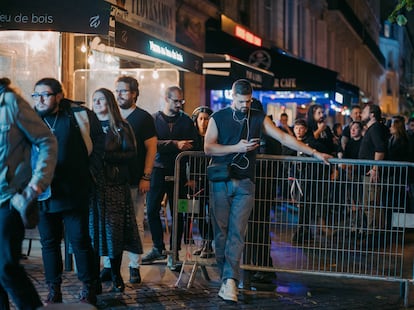
It’s been a horrible year. The attacks in Paris in 2015, with 130 deaths and then another four in a Jewish supermarket, or that in Nice the following year, where 86 deaths were hit by a truck, have left a wound in France from which fundamental values of the Republic such as secularism are slowly bleeding. It was also the fissure through which a part of the French left would begin to crack, forming two “irreconcilable” universes, in the words of then Prime Minister Manuel Valls.
Religious symbols such as the veil, some identity issues such as nationality (the discussion of its revocation due to an act of terrorism) and even a multitude of everyday issues have been simmering in the pot of public debate for years, from pork-free menus in school canteens, to the seat that a public bus driver might refuse to take if a woman sat there, to the handkerchief of a mother who accompanies her on school trips. Following this discussion, parties such as La Francia Insumisa (LFI) grew exponentially, which focused on suburbs (suburbs) their electoral strategy.
The only common thread was Islam. And the 2015 attacks have hardened positions, especially in some sectors of the left. “Immediately after the massacre (12 deaths) of Charlie HebdoFor example, there was a unanimous reaction. Freedom of expression had to be defended. But we see that now there are people who did not completely agree, who believed that we had offended Muhammad”, whose cartoons were published by the satirical magazine under attack, underlines the political scientist Marc Lazar regarding the storm that formed after the wave of attacks in 2015. “The attacks provoked the association made by the far right of Muslims with the Islamic terrorist himself. Since then, rejection of Islam has grown significantly. The effect was terrible,” he insists.
The September 2021 terrorist trial worked like collective therapy. There were 148 days of hearings, more than 400 testimonies from survivors and relatives, 330 lawyers, five magistrates, security measures and a courtroom built for the occasion, 14 defendants present (and another six absent, perhaps killed in Syria or Iraq), and all recorded by eight cameras: images and sounds for history. The essential thing was to clarify, as far as possible, the responsibilities of each of the accused and their guilt. Of those commandos, only one terrorist remained alive: Salah Abdeslam. But for the victims it was a way to close a chapter in history. “It allowed us to see that they were not monsters. To understand the human aspect. They didn’t understand very well why they had done it… They also answered questions. We had answers. Everything we know we learned there. Then we can continue to ask ourselves things, but we all came away thinking that if there had been a second trial we wouldn’t have known anything anymore,” says Arthur Dénouveaux, survivor of the Bataclan massacre and president of Life for Paris, one of the two associations created after the attacks.
Dénouveaux believes that in recent years the possibility of reflecting in depth on what happened has been lost. “We held many minutes of silence, but we discussed little about why in France there are still so many young people who want to attack other French people in the name of jihad (struggle or holy war). And to have more security we agreed to enact more and more laws that apply to terrorists, but not only. We entered into a logic of fear. We did not try to attack the problem at the root, which are those young people. It was a failure. The good thing is that we have better organized the secret services and intelligence and there are fewer attacks: the they try, but they stop.”
Real fear has diminished. Five years later, 93% of French people thought a similar attack could happen. Today this concern is around 60%. Olivier Roy, one of France’s leading experts on Islamism and radicalisation, believes the trial played a huge role in clarifying the origin of the attacks. “It showed a more complex vision of things. Jihadism was not a consequence of Salafism, of the Islamization of young people. It was a very violent phenomenon, but not rooted in the Muslim population in France. Even if it created a climate of evident tension, with an increase in Islamophobia. But politically there wasn’t much. Because that terrorist wave disappeared with the end of the caliphate. After 2017 there is no longer an organized terrorist threat, but rather particular cases in which psychiatry and ideology are mixed,” he underlines.
Changes have been slow. The echoes of the trauma persist. From a strictly scientific point of view, it is known that a society needs about nine months to return to normality after a serious terrorist attack. “It is the time that the United States needed after September 11th or Spain after March 11th. This does not mean that it returns exactly to its previous life, as if nothing had happened, but rather that it exits the zone of social turbulence triggered by the attack and that other issues occupy the front page of the news again,” explains sociologist Truc. And, in fact, they haven’t been ten particularly peaceful years.
The truly unprecedented thing that France experienced ten years ago is that it was hit three times by massive attacks, at nine-month intervals. Truc believes that this meant that France needed a long time to emerge from that long terrorist sequence: “The movement of yellow vests It is what marked the transition to another phase, starting from November 2018. But since then other unusual events have occurred: the covid-19 pandemic and the political crisis opened by the dissolution of the National Assembly. “The current state of French society is the result of all this.”
